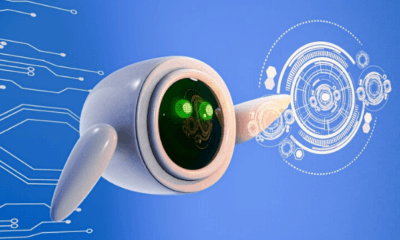AI
AI Regulation Impact Assessment Example: A Case Study
Greetings, esteemed readers. Have a nice day today as we delve into the fascinating realm of AI regulation impact assessment. In this article, we will explore a compelling case study that exemplifies the profound implications of regulating artificial intelligence. Through a detailed examination of a specific scenario, we aim to shed light on the intricate interplay between AI advancements and the need for comprehensive regulatory frameworks. Please continue reading to uncover the thought-provoking insights that lie ahead.
Understanding the Importance of AI Regulation
Understanding the Importance of AI RegulationArtificial Intelligence (AI) has become an integral part of our lives, revolutionizing various industries and enhancing our daily experiences.
As AI continues to advance at a rapid pace, it is crucial to understand the importance of regulating this powerful technology. Without proper regulations, AI can pose significant risks and challenges that may have far-reaching consequences.
Why is AI regulation important?1. Ensuring Ethical Use: AI has the potential to make autonomous decisions that may impact individuals and society as a whole.
Regulation is necessary to ensure that AI systems are designed and deployed ethically, with proper consideration given to human rights, privacy, and fairness.
2. Mitigating Bias and Discrimination: AI algorithms can inadvertently perpetuate biases and discrimination present in the data they are trained on. Regulation plays a vital role in addressing these biases, promoting transparency, and ensuring that AI systems treat all individuals fairly and without prejudice.
How does AI regulation benefit society?1. Protecting Privacy: AI regulation helps safeguard individuals’ privacy by establishing guidelines for data collection, storage, and usage.
This ensures that personal information is handled responsibly and that individuals have control over their data.2. Promoting Accountability: AI regulation encourages developers and organizations to be accountable for the actions and decisions made by AI systems.
This accountability fosters trust and allows for effective recourse in the event of AI-related errors or harms.As AI becomes increasingly prevalent in our lives, it is essential that we embrace the importance of regulation.
By ensuring ethical use, mitigating biases, protecting privacy, and promoting accountability, we can harness the full potential of AI while safeguarding the rights and well-being of individuals and society as a whole.
Visit our main page Tecmenu.com
The Need for Case Studies in AI Regulation Impact Assessment
The need for case studies in AI regulation impact assessment is crucial in today’s rapidly advancing technological landscape. As artificial intelligence continues to permeate various aspects of our lives, it becomes imperative to understand its potential impacts on society, ethics, and the economy.
Case studies provide valuable insights into real-world scenarios where AI systems have been deployed, allowing regulators to evaluate the benefits and risks associated with these technologies.
By analyzing the outcomes of specific cases, policymakers can make informed decisions about the appropriate regulations and safeguards necessary to ensure the responsible and ethical use of AI.
These case studies not only shed light on the potential risks and challenges but also highlight the opportunities and benefits that AI can bring when properly regulated.
Ultimately, through a comprehensive assessment of AI’s impact, case studies help create a regulatory framework that balances innovation, accountability, and societal well-being.
Case Study Overview: Examining the Impact of AI in a Specific Industry
In this case study, we delve into the fascinating world of AI and its impact on a specific industry. By examining real-life examples and data, we uncover the transformative power of artificial intelligence in revolutionizing processes, increasing efficiency, and driving innovation.
From automating mundane tasks to predicting consumer behavior, AI has become an indispensable tool for businesses in this industry. Through step-by-step analysis, we explore the challenges faced, the opportunities seized, and the overall transformation brought about by AI.
This case study provides a comprehensive overview of how AI is reshaping this specific industry, paving the way for a future where technology and human ingenuity work hand in hand.
Identifying Key Stakeholders in AI Regulation Impact Assessment
Identifying Key Stakeholders in AI Regulation Impact Assessment: A Crucial Step Towards Responsible Governance. Ensuring Inclusive Perspectives: Recognizing the diverse voices of citizens, experts, and industry representatives.
Balancing Interests: Striving for equitable regulation that considers the concerns of stakeholders while fostering innovation and societal benefits.
Gathering Data and Information for the Assessment
Gathering data and information for the assessment is a crucial step in any project or research. It involves collecting relevant data from various sources, such as surveys, interviews, observations, and existing literature.
Why is gathering data important? What are the different methods to gather data effectively? How can data be analyzed and interpreted to draw meaningful conclusions?
What challenges can arise during the data gathering process, and how can they be overcome? These are some common questions that everyone should consider when embarking on a data gathering journey.
Remember, accurate and reliable data is the foundation of any successful assessment.
Analyzing the Ethical and Legal Implications of AI in the Case Study
AI has revolutionized industries, but its ethical and legal implications are complex. In the case study, the use of AI raises concerns about privacy, bias, and accountability.
Firstly, the collection and use of personal data by AI systems create privacy risks, demanding transparent data practices. Secondly, AI algorithms can perpetuate biases, leading to unfair treatment of certain groups.
Addressing bias requires careful design and regular auditing of AI systems. Lastly, the accountability of AI decision-making is ambiguous, necessitating clear guidelines and regulations.
Understanding these implications is crucial in harnessing AI’s potential while mitigating its negative impacts, ensuring that AI is developed and deployed in an ethical and legally responsible manner.
Assessing the Economic Impact of AI Regulation in the Case Study
Artificial intelligence (AI) regulation has sparked debates worldwide. In a recent case study, economists delved into the economic impact of AI regulation.
The findings revealed a complex landscape. While stringent regulations may stifle innovation, they also offer a sense of security to consumers and businesses.
Balancing these factors is crucial for policymakers. Striking the right balance could foster AI development while safeguarding against potential risks, ultimately shaping the future economic landscape.
Sayings Before You Go
In conclusion, the case study on AI regulation impact assessment provides valuable insights into the complexities and challenges of regulating AI technologies.
By understanding the potential impacts and developing effective assessment frameworks, policymakers can navigate the evolving landscape of AI with greater clarity and foresight.
As we bid farewell to another intriguing article, we encourage you to share this knowledge with your friends and colleagues. Thank you for reading.
About The Author
AI
Artificial Intelligence Debate: Exploring the Pros and Cons for Society

Businessreign.com – Artificial intelligence (AI) has revolutionized various aspects of our lives, from the smartphones we carry to the cars we drive. While AI has undoubtedly brought about significant advancements, it has also sparked a heated debate about its overall impact on humanity.
The Benefits of Artificial Intelligence
Proponents of AI highlight numerous advantages that this technology offers to society. These include:
- Enhanced Efficiency and Productivity: AI automates repetitive tasks, freeing up human workers to focus on more complex and creative endeavors. This automation streamlines processes, increases output, and reduces costs across various sectors.
- Improved Decision-Making: AI algorithms can analyze vast amounts of data to identify patterns, trends, and anomalies that humans might miss. This capability enables better-informed decisions in areas such as healthcare, finance, and risk assessment.
- Personalized Experiences: AI tailors products, services, and content to individual preferences and needs. This personalization enhances user experiences, improves customer satisfaction, and drives engagement.
- Advanced Scientific Research: AI accelerates scientific breakthroughs by analyzing complex data, generating hypotheses, and conducting simulations. This contribution drives progress in fields like medicine, materials science, and environmental research.
The Concerns Surrounding Artificial Intelligence
Despite its undeniable benefits, AI raises concerns that have fueled a debate about its overall impact on society. These concerns include:
- Job Displacement: AI automation raises fears of widespread job losses, particularly in industries reliant on repetitive tasks. This displacement could lead to economic hardship and social unrest.
- Algorithmic Bias: AI algorithms can perpetuate existing biases in the data they are trained on. This bias can lead to discriminatory outcomes in areas like hiring, loan applications, and criminal justice.
- Privacy and Security Risks: AI systems collect and analyze vast amounts of personal data, raising concerns about privacy breaches and misuse of information. This data can be exploited for surveillance, manipulation, and identity theft.
- Loss of Control and Ethical Dilemmas: The increasing sophistication of AI raises concerns about human control over these systems. Ethical dilemmas arise when AI makes decisions that have significant consequences for individuals and society.
Navigating the Future of AI
As AI continues to evolve, it is crucial to address both its potential benefits and its associated risks. Governments, businesses, and individuals must collaborate to ensure that AI is developed and used responsibly, ethically, and for the betterment of society.
Conclusion
AI is a powerful tool that has the potential to transform our world for the better. However, it is essential to approach AI with caution and foresight, ensuring that its development and application align with human values and societal well-being. By carefully navigating the pros and cons of AI, we can harness its power to create a future that benefits all of humanity
About The Author
AI
The Double-Edged Sword: Exploring the Pros and Cons of Artificial Intelligence

Businessreign.com – Artificial intelligence (AI) has permeated nearly every aspect of our lives, from the smartphones we carry to the cars we drive. While AI has undoubtedly brought about significant advancements, it has also sparked a heated debate about its overall impact on humanity.
The Benefits of Artificial Intelligence
Proponents of AI highlight numerous advantages that this technology offers to society. These include:
- Enhanced Efficiency and Productivity: AI automates repetitive tasks, freeing up human workers to focus on more complex and creative endeavors. This automation streamlines processes, increases output, and reduces costs across various sectors.
- Improved Decision-Making: AI algorithms can analyze vast amounts of data to identify patterns, trends, and anomalies that humans might miss. This capability enables better-informed decisions in areas such as healthcare, finance, and risk assessment.
- Personalized Experiences: AI tailors products, services, and content to individual preferences and needs. This personalization enhances user experiences, improves customer satisfaction, and drives engagement.
- Advanced Scientific Research: AI accelerates scientific breakthroughs by analyzing complex data, generating hypotheses, and conducting simulations. This contribution drives progress in fields like medicine, materials science, and environmental research.
The Concerns Surrounding Artificial Intelligence
Despite its undeniable benefits, AI raises concerns that have fueled a debate about its overall impact on society. These concerns include:
- Job Displacement: AI automation raises fears of widespread job losses, particularly in industries reliant on repetitive tasks. This displacement could lead to economic hardship and social unrest.
- Algorithmic Bias: AI algorithms can perpetuate existing biases in the data they are trained on. This bias can lead to discriminatory outcomes in areas like hiring, loan applications, and criminal justice.
- Privacy and Security Risks: AI systems collect and analyze vast amounts of personal data, raising concerns about privacy breaches and misuse of information. This data can be exploited for surveillance, manipulation, and identity theft.
- Loss of Control and Ethical Dilemmas: The increasing sophistication of AI raises concerns about human control over these systems. Ethical dilemmas arise when AI makes decisions that have significant consequences for individuals and society.
Navigating the Future of AI
As AI continues to evolve, it is crucial to address both its potential benefits and its associated risks. Governments, businesses, and individuals must collaborate to ensure that AI is developed and used responsibly, ethically, and for the betterment of society.
Conclusion
AI is a powerful tool that has the potential to transform our world for the better. However, it is essential to approach AI with caution and foresight, ensuring that its development and application align with human values and societal well-being. By carefully navigating the pros and cons of AI, we can harness its power to create a future that benefits all of humanity.
About The Author
AI
Artificial Intelligence Debate: Exploring the Pros and Cons for Society

Businessreign.com – Artificial intelligence (AI) has permeated nearly every aspect of our lives, from the smartphones we carry to the cars we drive. While AI has undoubtedly brought about significant advancements, it has also sparked a heated debate about its overall impact on humanity.
The Benefits of Artificial Intelligence
Proponents of AI highlight numerous advantages that this technology offers to society. These include:
- Enhanced Efficiency and Productivity: AI automates repetitive tasks, freeing up human workers to focus on more complex and creative endeavors. This automation streamlines processes, increases output, and reduces costs across various sectors.
- Improved Decision-Making: AI algorithms can analyze vast amounts of data to identify patterns, trends, and anomalies that humans might miss. This capability enables better-informed decisions in areas such as healthcare, finance, and risk assessment.
- Personalized Experiences: AI tailors products, services, and content to individual preferences and needs. This personalization enhances user experiences, improves customer satisfaction, and drives engagement.
- Advanced Scientific Research: AI accelerates scientific breakthroughs by analyzing complex data, generating hypotheses, and conducting simulations. This contribution drives progress in fields like medicine, materials science, and environmental research.
The Concerns Surrounding Artificial Intelligence
Despite its undeniable benefits, AI raises concerns that have fueled a debate about its overall impact on society. These concerns include:
- Job Displacement: AI automation raises fears of widespread job losses, particularly in industries reliant on repetitive tasks. This displacement could lead to economic hardship and social unrest.
- Algorithmic Bias: AI algorithms can perpetuate existing biases in the data they are trained on. This bias can lead to discriminatory outcomes in areas like hiring, loan applications, and criminal justice.
- Privacy and Security Risks: AI systems collect and analyze vast amounts of personal data, raising concerns about privacy breaches and misuse of information. This data can be exploited for surveillance, manipulation, and identity theft.
- Loss of Control and Ethical Dilemmas: The increasing sophistication of AI raises concerns about human control over these systems. Ethical dilemmas arise when AI makes decisions that have significant consequences for individuals and society.
Navigating the Future of AI
As AI continues to evolve, it is crucial to address both its potential benefits and its associated risks. Governments, businesses, and individuals must collaborate to ensure that AI is developed and used responsibly, ethically, and for the betterment of society.
Conclusion
AI is a powerful tool that has the potential to transform our world for the better. However, it is essential to approach AI with caution and foresight, ensuring that its development and application align with human values and societal well-being. By carefully navigating the pros and cons of AI, we can harness its power to create a future that benefits all of humanity.
About The Author

 Business9 months ago
Business9 months agoMaster Business Planning: Essential Guide for Aspiring Entrepreneurs

 Business9 months ago
Business9 months agoBusiness Innovation: Top Idea Generation Techniques for Entrepreneurs

 tech11 months ago
tech11 months agoNvidia Neuromorphic Chip: Advancing AI Technology

 Business9 months ago
Business9 months agoOldest private members’ clubs London: Historical Gems
- AI9 months ago
Should AI Be Banned: Pros, Cons, and the Future of Education

 Business9 months ago
Business9 months agoFamous private clubs in London: Renowned Establishments

 Artificial Intelligence9 months ago
Artificial Intelligence9 months agoArtificial Intelligence Is a Threat to Humanity: Debate Points
- Business11 months ago
John Lewis CEO: Leadership and Strategy (Who is the Current CEO? also works)

